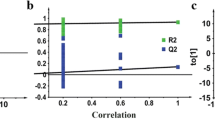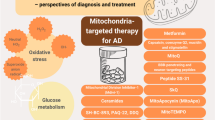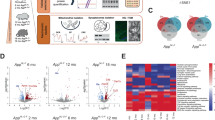Abstract
Introduction
Accumulation of β-amyloid (Aβ) in neurons of patients with Alzheimer’s disease (AD) inhibits the activity of key enzymes in mitochondrial metabolic pathways, triggering mitochondrial dysfunction, which plays an important role in the onset and development of AD. Mitophagy is a process whereby dysfunctional or damaged mitochondria are removed from the cell. Aberrant mitochondrial metabolism may hinder mitophagy, promote autophagosome accumulation, and lead to neuronal death.
Objectives
The aim of this experiment is to explore the mechanism of neuronal mitochondria damage in the hippocampus of different age APP/PS1 double transgenic AD mice, and to explore the related metabolites and metabolic pathways for further understanding of the pathogenesis, so as to provide new ideas and strategies for the treatment of AD.
Methods
In this study, 24 APP/PS1(APPswe/PSEN1dE9) mice were divided into 3, 6, 9, and 12-month-old groups, and 6-month-old wild-type C57BL/6 mice were as controls. The Morris water maze test was used to evaluate learning and memory. Levels of Aβ were detected by immunohistochemistry. Electron microscopy was used to observe mitochondrial damage and autophagosome accumulation. Western blot was for measuring LC3, P62, PINK1, Parkin, Miro1, and Tom 20 protein expression levels. Gas chromatography coupled with mass spectrometry was used to screen differentially abundant metabolites.
Results
The results showed that with the increase of age in APP/PS1 mice, cognitive impairment, hippocampal neuron mitochondrial damage, and autophagosome accumulation all increased. Furthermore, enhanced mitophagy and impaired mitochondrial clearance leading to metabolic abnormalities were observed with ageing in APP/PS1 mouse hippocampus. Especially, abnormal accumulation of succinic acid and citric acid in the Krebs cycle was observed.
Conclusion
This study investigated the abnormal glucose metabolism associated with age-related damage to mitochondria in the hippocampus of APP/PS1 mice. These findings provide new insights into the pathogenesis of AD.





Similar content being viewed by others
Data availability
The availability of all data presented in this study is from authors upon request.
Abbreviations
- AD:
-
Alzheimer’s disease
- Aβ:
-
β-amyloid
- NFTs:
-
Neurofibrillary tangles
- APP:
-
Amyloid precursor protein
- ATP:
-
Adenosine triphosphate
- LC3:
-
Microtubule-associated protein LC3
- TOM20:
-
Translocase of outer membrane 20
- PCA:
-
Principal component analysis
- P62:
-
Sequestosome 1
- PINK1 :
-
PTEN-induced putative kinase 1
- BCA:
-
Bicinchoninic acid
- TEM:
-
Transmission electron microscopy
- MWM:
-
Morris water maze test
- APP/PS1 double transgenic mice:
-
APPswe/PSEN1dE9 (APP/PSI) transgenic Alzheimer’s disease model mice
References
Akbari, M., Kirkwood, T. B. L., & Bohr, V. A. (2019). Mitochondria in the signaling pathways that control longevity and health span. Ageing Research Reviews, 54, 100940. https://doi.org/10.1016/j.arr.2019.100940.
An, Y., et al. (2018). Evidence for brain glucose dysregulation in Alzheimer’s disease. Alzheimers Dement, 14, 318–329. https://doi.org/10.1016/j.jalz.2017.09.011.
Babcock, K. R., Page, J. S., Fallon, J. R., & Webb, A. E. (2021). Adult hippocampal neurogenesis in aging and Alzheimer’s Disease. Stem Cell Reports, 16, 681–693. https://doi.org/10.1016/j.stemcr.2021.01.019.
Barthelemy, N. R., et al. (2020). A soluble phosphorylated tau signature links tau, amyloid and the evolution of stages of dominantly inherited Alzheimer’s disease. Nature Medicine, 26, 398–407. https://doi.org/10.1038/s41591-020-0781-z.
Benito-Cuesta, I., Ordonez-Gutierrez, L., & Wandosell, F. (2021). AMPK activation does not enhance autophagy in neurons in contrast to MTORC1 inhibition: Different impact on beta-amyloid clearance. Autophagy, 17, 656–671. https://doi.org/10.1080/15548627.2020.1728095.
Bharat, V., & Wang, X. (2020). Precision Neurology for Parkinson’s Disease: Coupling Miro1-Based diagnosis with Drug Discovery. Movement Disorders, 35, 1502–1508. https://doi.org/10.1002/mds.28194.
Butterfield, D. A., & Halliwell, B. (2019). Oxidative stress, dysfunctional glucose metabolism and Alzheimer disease. Nature Reviews Neuroscience, 20, 148–160. https://doi.org/10.1038/s41583-019-0132-6.
Cai, Q., & Jeong, Y. Y. (2020). Mitophagy in Alzheimer’s Disease and other Age-Related neurodegenerative Diseases. Cells, 9, https://doi.org/10.3390/cells9010150.
Cen, X., et al. (2020). Pharmacological targeting of MCL-1 promotes mitophagy and improves disease pathologies in an Alzheimer’s disease mouse model. Nature Communications, 11, 5731. https://doi.org/10.1038/s41467-020-19547-6.
Chai, Y. L., et al. (2018). Mitochondrial translocase of the outer membrane alterations may underlie dysfunctional oxidative phosphorylation in Alzheimer’s Disease. Journal Of Alzheimer’S Disease, 61, 793–801. https://doi.org/10.3233/JAD-170613.
Croteau, E., et al. (2018). Ketogenic medium chain triglycerides increase Brain Energy Metabolism in Alzheimer’s Disease. Journal Of Alzheimer’S Disease, 64, 551–561. https://doi.org/10.3233/JAD-180202.
Eysert, F., Kinoshita, P. F., Mary, A., Vaillant-Beuchot, L., Checler, F., & Chami, M. (2020). Molecular Dysfunctions of Mitochondria-Associated membranes (MAMs) in Alzheimer’s Disease. International Journal Of Molecular Sciences, 21, https://doi.org/10.3390/ijms21249521.
Fang, E. F., et al. (2019). Mitophagy inhibits amyloid-beta and tau pathology and reverses cognitive deficits in models of Alzheimer’s disease. Nature Neuroscience, 22, 401–412. https://doi.org/10.1038/s41593-018-0332-9.
Ferrari, C., & Sorbi, S. (2021). The complexity of Alzheimer’s disease: An evolving puzzle. Physiological Reviews, 101, 1047–1081. https://doi.org/10.1152/physrev.00015.2020.
Gao, H., et al. (2018). Quantitative GC-MS assay of citric acid from humans and db/db mice blood serum to assist the diagnosis of diabetic nephropathy. Journal Of Chromatography. B, Analytical Technologies In The Biomedical And Life Sciences, 1077–1078, 28–34. https://doi.org/10.1016/j.jchromb.2017.12.021.
Hou, Y., et al. (2019). Ageing as a risk factor for neurodegenerative disease. Nat Rev Neurol, 15, 565–581. https://doi.org/10.1038/s41582-019-0244-7.
Imai, Y. (2020). PINK1-Parkin signaling in Parkinson’s disease: Lessons from Drosophila. Neuroscience Research, 159, 40–46. https://doi.org/10.1016/j.neures.2020.01.016.
Jadiya, P., et al. (2019). Impaired mitochondrial calcium efflux contributes to disease progression in models of Alzheimer’s disease. Nature Communications, 10, 3885. https://doi.org/10.1038/s41467-019-11813-6.
Jeong, S. (2017). Molecular and Cellular basis of Neurodegeneration in Alzheimer’s Disease. Molecules And Cells, 40, 613–620. https://doi.org/10.14348/molcells.2017.0096.
John, A., & Reddy, P. H. (2021). Synaptic basis of Alzheimer’s disease: Focus on synaptic amyloid beta, P-tau and mitochondria. Ageing Research Reviews, 65, 101208. https://doi.org/10.1016/j.arr.2020.101208.
Kane, L. A., & Youle, R. J. (2011). PINK1 and parkin flag miro to direct mitochondrial traffic. Cell, 147, 721–723. https://doi.org/10.1016/j.cell.2011.10.028.
Li, Q., Liu, Y., & Sun, M. (2017). Autophagy and Alzheimer’s Disease. Cellular And Molecular Neurobiology, 37, 377–388. https://doi.org/10.1007/s10571-016-0386-8.
Liu, S., et al. (2012). Parkinson’s disease-associated kinase PINK1 regulates Miro protein level and axonal transport of mitochondria. Plos Genetics, 8, e1002537. https://doi.org/10.1371/journal.pgen.1002537.
Lonnemann, N., et al. (2020). The NLRP3 inflammasome inhibitor OLT1177 rescues cognitive impairment in a mouse model of Alzheimer’s disease. Proc Natl Acad Sci U S A, 117, 32145–32154. https://doi.org/10.1073/pnas.2009680117.
Lopez-Domenech, G., et al. (2018). Miro proteins coordinate microtubule- and actin-dependent mitochondrial transport and distribution. Embo Journal, 37, 321–336. https://doi.org/10.15252/embj.201696380.
Lopez-Domenech, G., et al. (2021). Loss of neuronal Miro1 disrupts mitophagy and induces hyperactivation of the integrated stress response. Embo Journal, 40, e100715. https://doi.org/10.15252/embj.2018100715.
Luo, R., et al. (2020). Activation of PPARA-mediated autophagy reduces Alzheimer disease-like pathology and cognitive decline in a murine model. Autophagy, 16, 52–69. https://doi.org/10.1080/15548627.2019.1596488.
Mahajan, U. V., et al. (2020). Dysregulation of multiple metabolic networks related to brain transmethylation and polyamine pathways in Alzheimer disease: A targeted metabolomic and transcriptomic study. Plos Medicine, 17, e1003012. https://doi.org/10.1371/journal.pmed.1003012.
Martinez-Reyes, I., & Chandel, N. S. (2020). Mitochondrial TCA cycle metabolites control physiology and disease. Nature Communications, 11, 102. https://doi.org/10.1038/s41467-019-13668-3.
Nikolac Perkovic, M., et al. (2021). Epigenetics of Alzheimer’s Disease. Biomolecules, 11, https://doi.org/10.3390/biom11020195.
Panchal, K., & Tiwari, A. K. (2021). Miro (mitochondrial rho GTPase), a key player of mitochondrial axonal transport and mitochondrial dynamics in neurodegenerative diseases. Mitochondrion, 56, 118–135. https://doi.org/10.1016/j.mito.2020.10.005.
Park, M. W., et al. (2021). NOX4 promotes ferroptosis of astrocytes by oxidative stress-induced lipid peroxidation via the impairment of mitochondrial metabolism in Alzheimer’s diseases. Redox Biology, 41, 101947. https://doi.org/10.1016/j.redox.2021.101947.
Patro, S., et al. (2021). ATP synthase and mitochondrial bioenergetics dysfunction in Alzheimer’s Disease. International Journal Of Molecular Sciences, 22, https://doi.org/10.3390/ijms222011185.
Perez Ortiz, J. M., & Swerdlow, R. H. (2019). Mitochondrial dysfunction in Alzheimer’s disease: Role in pathogenesis and novel therapeutic opportunities. British Journal Of Pharmacology, 176, 3489–3507. https://doi.org/10.1111/bph.14585.
Pradeepkiran, J. A., & Reddy, P. H. (2020). Defective mitophagy in Alzheimer’s disease. Ageing Research Reviews, 64, 101191. https://doi.org/10.1016/j.arr.2020.101191.
Quinn, P. M. J., Moreira, P. I., Ambrosio, A. F., & Alves, C. H. (2020). PINK1/PARKIN signalling in neurodegeneration and neuroinflammation. Acta Neuropathol Commun, 8, 189. https://doi.org/10.1186/s40478-020-01062-w.
Reddy, P. H., & Oliver, D. M. (2019). Amyloid Beta and phosphorylated Tau-Induced defective autophagy and Mitophagy in Alzheimer’s Disease. Cells, 8, https://doi.org/10.3390/cells8050488.
Reddy, P. H., et al. (2018). Mutant APP and amyloid beta-induced defective autophagy, mitophagy, mitochondrial structural and functional changes and synaptic damage in hippocampal neurons from Alzheimer’s disease. Human Molecular Genetics, 27, 2502–2516. https://doi.org/10.1093/hmg/ddy154.
Scheltens, P., et al. (2021). Alzheimer’s disease. Lancet, 397, 1577–1590. https://doi.org/10.1016/S0140-6736(20)32205-4.
Shoshan-Barmatz, V., Nahon-Crystal, E., Shteinfer-Kuzmine, A., & Gupta, R. (2018). VDAC1, mitochondrial dysfunction, and Alzheimer’s disease. Pharmacological Research, 131, 87–101. https://doi.org/10.1016/j.phrs.2018.03.010.
Sun, K., Jing, X., Guo, J., Yao, X., & Guo, F. (2021). Mitophagy in degenerative joint diseases. Autophagy, 17, 2082–2092. https://doi.org/10.1080/15548627.2020.1822097.
Swerdlow, R. H. (2018). Mitochondria and mitochondrial cascades in Alzheimer’s Disease. Journal Of Alzheimer’S Disease, 62, 1403–1416. https://doi.org/10.3233/JAD-170585.
Tang, B. L. (2020). Glucose, glycolysis, and neurodegenerative diseases. Journal Of Cellular Physiology, 235, 7653–7662. https://doi.org/10.1002/jcp.29682.
Tolar, M., Abushakra, S., & Sabbagh, M. (2020). The path forward in Alzheimer’s disease therapeutics: Reevaluating the amyloid cascade hypothesis. Alzheimers Dement, 16, 1553–1560. https://doi.org/10.1016/j.jalz.2019.09.075.
Velazquez, R., et al. (2019). Lifelong choline supplementation ameliorates Alzheimer’s disease pathology and associated cognitive deficits by attenuating microglia activation. Aging Cell, 18, e13037. https://doi.org/10.1111/acel.13037.
Wang, N., et al. (2020a). PINK1: The guard of mitochondria. Life Sciences, 259, 118247. 10.1016/j.lfs.2020a.118247.
Wang, W., Zhao, F., Ma, X., Perry, G., & Zhu, X. (2020b). Mitochondria dysfunction in the pathogenesis of Alzheimer’s disease: Recent advances. Mol Neurodegener, 15, 30. 10.1186/s13024-020-00376-6.
Weidling, I. W., & Swerdlow, R. H. (2020). Mitochondria in Alzheimer’s disease and their potential role in Alzheimer’s proteostasis. Experimental Neurology, 330, 113321. https://doi.org/10.1016/j.expneurol.2020.113321.
Xiong, X., et al. (2020). Study of mitophagy and ATP-related metabolomics based on beta-amyloid levels in Alzheimer’s disease. Experimental Cell Research, 396, 112266. https://doi.org/10.1016/j.yexcr.2020.112266.
Yin, F., Boveris, A., & Cadenas, E. (2014). Mitochondrial energy metabolism and redox signaling in brain aging and neurodegeneration. Antioxidants & Redox Signaling, 20, 353–371. https://doi.org/10.1089/ars.2012.4774.
Zhao, Y., Zeng, C. Y., Li, X. H., Yang, T. T., Kuang, X., & Du, J. R. (2020). Klotho overexpression improves amyloid-beta clearance and cognition in the APP/PS1 mouse model of Alzheimer’s disease. Aging Cell, e13239. https://doi.org/10.1111/acel.13239.
Zhou, F., et al. (2020). Enhanced autophagic retrograde axonal transport by dynein intermediate chain upregulation improves Abeta clearance and cognitive function in APP/PS1 double transgenic mice. Aging (Albany NY), 12, 12142–12159. https://doi.org/10.18632/aging.103382.
Alzheimer’s disease facts and figures. Alzheimers Dement 18, 700–789 doi:https://doi.org/10.1002/alz.12638
Acknowledgements
The authors thank all APP/PS1 mice who participated and continue to contribute to ongoing research. This work was supported by The Performance Incentive Guidance for Scientific Research Institution of Chongqing (No. cstc2020jxjl130013); and the Fundamental Research Funds for the Central University (No. 2019CDYGZD002).
Author information
Authors and Affiliations
Contributions
LSJ and LY were responsible for study design, statistical analysis and manuscript preparation. LSJ, XXM, ZFL, LGX, PY and LXJ conducted experiments. WYY, FJN and LX analyzed data. LSJ, ZX and LY wrote the manuscript. All authors read and approved the manuscript.
Corresponding author
Ethics declarations
Competing interests
The authors declare that they have no known competing financial interests or personal relationships that could have appeared to influence the work reported in this paper.
Ethics approval and consent to participate
Experiments in mice were performed under Ethical code: CZLS2022061-A of Chongqing University Cancer Hospital.
Additional information
Publisher’s Note
Springer Nature remains neutral with regard to jurisdictional claims in published maps and institutional affiliations.
Rights and permissions
Springer Nature or its licensor (e.g. a society or other partner) holds exclusive rights to this article under a publishing agreement with the author(s) or other rightsholder(s); author self-archiving of the accepted manuscript version of this article is solely governed by the terms of such publishing agreement and applicable law.
About this article
Cite this article
Li, S., Wang, Y., Zhang, X. et al. Mitochondrial damage-induced abnormal glucose metabolism with ageing in the hippocampus of APP/PS1 mice. Metabolomics 19, 56 (2023). https://doi.org/10.1007/s11306-023-02023-9
Received:
Accepted:
Published:
DOI: https://doi.org/10.1007/s11306-023-02023-9




